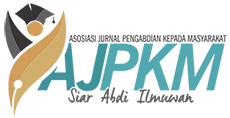Pelatihan Bahan Baku Pangan Halal bagi Pelaku Usaha Mikro dan Kecil di Solo Raya
Main Article Content
Sadewa Aziz Diamonda
Nurwulan Purnasari
Knowledge about raw food materials is one of the most critical things to halal that UMKM's business owners must know. Raw food materials that are free from najis will be one of the determinants of the final product's halal status. This program aimed to introduce and provide information about safe raw food materials and non-potentially haram. This program was held to train the food business owner around Solo Raya. They are trained to identify safe raw food materials dan non potentially haram in manufacturing each of their business products.
Alqudsi, S. G. (2014). Awareness and Demand for 100% Halal Supply Chain Meat Products. Procedia - Social and Behavioral Sciences, 130, 167–178. https://doi.org/10.1016/j.sbspro.2014.04.021
Fadzlillah, N. A., Man, Y. B. C., Jamaludin, M. A., Rahman, S. A., & Al-kahtani, H. A. (2011). Halal Food Issues from Islamic and Modern Science Perspectives. 17, 159–163.
Hamdan, H., Issa, Z. M., Abu, N., & Jusoff, K. (2013). Purchasing Decisions among Muslim Consumers of Processed Halal Food Products. Journal of Food Products Marketing, 19(1), 54–61. https://doi.org/10.1080/10454446.2013.724365
Haqqoni, N. S., Aprilia, F. P., & Maulina, I. N. (2020). Awareness level of halal food products and healthy lifestyles for realizing SDGS (comparative study before and when covid- 19). Airlangga International Journal of Islamic Economics and Finance, 3(2), 111. https://doi.org/10.20473/aijief.v3i2.23876
Kurniawan. (2020). Ada 30.000 Industri dan 250.000 UMKM Di Soloraya, Apindo Solo Ingin Cawali Gibran Lakukan Ini - Solopos.com. Retrieved July 18, 2022, from Solopos website: https://www.solopos.com/ada-30-000-industri-dan-250-000-umkm-di-soloraya-apindo-solo-ingin-cawali-gibran-lakukan-ini-1092747
Maulida, R. (2013). Urgensi regulasi dan edukasi produk halal bagi konsumen. Justicia Islamica, 10(2). https://doi.org/10.21154/justicia.v10i2.153
Nurhasah, S., Munandar, J. M., & Syamsun, M. (2018). Faktor-Faktor yang Mempengaruhi Minat Beli Produk Makanan Olahan Halal pada Konsumen. Jurnal Manajemen Dan Organisasi, 8(3), 250–260. https://doi.org/10.29244/jmo.v8i3.22473
Rohman, A., & Che Man, Y. B. (2012). Analysis of Pig Derivatives for Halal Authentication Studies. Food Reviews International, 28(1), 97–112. https://doi.org/10.1080/87559129.2011.595862
Shah, H., & Yusof, F. (2014a). Gelatin as an ingredient in food and pharmaceutical products: An islamic perspective. Advances in Environmental Biology, 8(3 SPEC. ISSUE), 774–780.
Shah, H., & Yusof, F. (2014b). Gelatin as an ingredient in food and pharmaceutical products: An islamic perspective. Advances in Environmental Biology, 8(3 SPEC. ISSUE), 774–780.
Sukoso, Wiryawan, A., Kusnadi, J., & Sucipto. (2020). Ekosistem Industri Halal. Departemen Ekonomi dan Keuangan Syariah Bank Indonesia.
Syazwan Ab Talib, M., & Remie Mohd Johan, M. (2012). Issues in Halal Packaging: A Conceptual Paper. International Business and Management, 5(2), 94–98. https://doi.org/10.3968/j.ibm.1923842820120502.1080
Waharini, F. M., & Purwantini, A. H. (2018). Model Pengembangan Industri Halal Food di Indonesia. Muqtasid: Jurnal Ekonomi Dan Perbankan Syariah, 9(1), 1. https://doi.org/10.18326/muqtasid.v9i1.1-13
Wijayant, R., & Kaukab, M. E. (2019). Istihalah Issue of Halal Food, Medicine, and Cosmetics. Journal of Islamic, Social, Economics and Development, 4(Mac 2019), 203–213.











